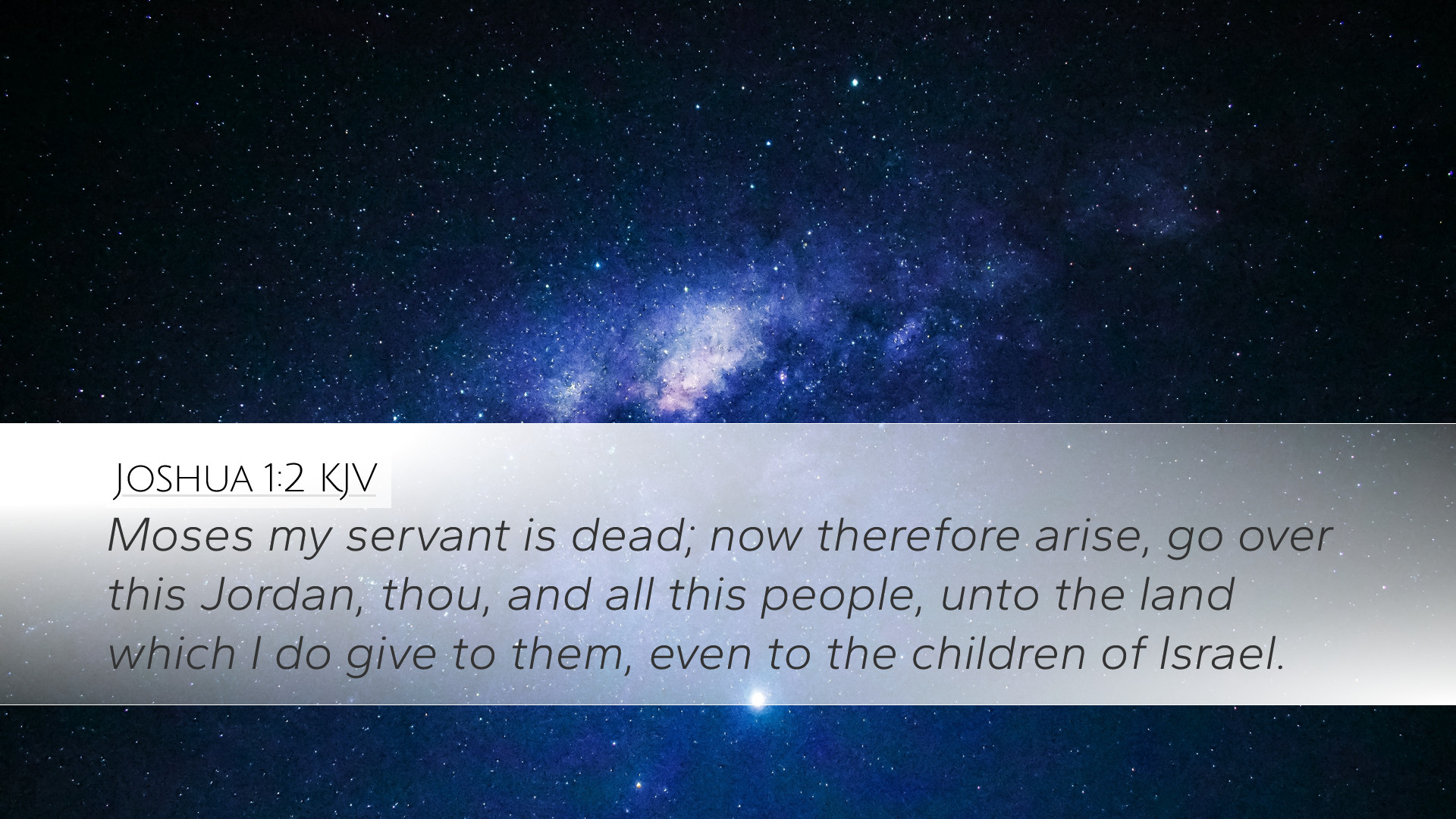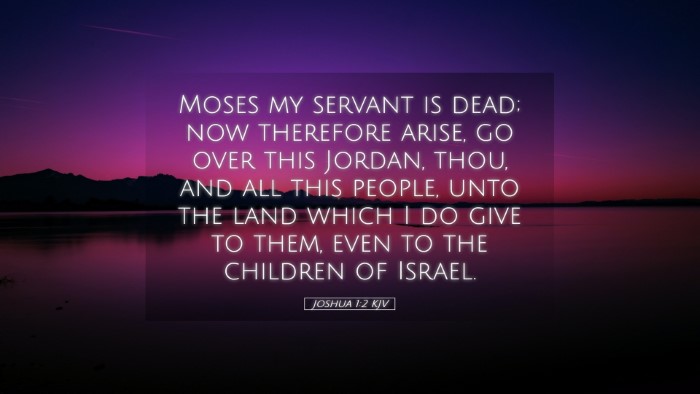Old Testament
Genesis Exodus Leviticus Numbers Deuteronomy Joshua Judges Ruth 1 Samuel 2 Samuel 1 Kings 2 Kings 1 Chronicles 2 Chronicles Ezra Nehemiah Esther Job Psalms Proverbs Ecclesiastes Song of Solomon Isaiah Jeremiah Lamentations Ezekiel Daniel Hosea Joel Amos Obadiah Jonah Micah Nahum Habakkuk Zephaniah Haggai Zechariah MalachiJoshua 1:2
Joshua 1:2 KJV
Moses my servant is dead; now therefore arise, go over this Jordan, thou, and all this people, unto the land which I do give to them, even to the children of Israel.
Joshua 1:2 Bible Commentary
Commentary on Joshua 1:2
Verse: "Moses my servant is dead; now therefore arise, go over this Jordan, thou, and all this people, unto the land which I do give to them, even to the children of Israel."
Introduction
The opening of the book of Joshua marks a significant transition in Israel's history, as they move from wandering in the wilderness to taking possession of the Promised Land. This verse serves as a pivotal moment where God commissions Joshua to lead His people. Here, we shall explore various insights from public domain commentaries, providing a comprehensive understanding beneficial for pastors, students, theologians, and Bible scholars.
The Death of Moses
The passage begins with the solemn announcement that "Moses my servant is dead." This statement carries profound weight, as Moses was not only a leader but also a mediator between God and Israel. His death represents a closing chapter of the Exodus narrative.
- Matthew Henry emphasizes the shift in leadership from Moses to Joshua, indicating the importance of steady guidance from God through leadership transitions.
- Albert Barnes notes the legacy left by Moses, whose life and leadership were characterized by obedience and service, setting a high standard for Joshua to follow.
- Adam Clarke stresses the nature of Moses’ death in relation to God’s purposes, proposing that his departure was essential for Israel to fully embrace their new identity and mission.
God's Command to Arise
Following the announcement of Moses' death, God commands Joshua to "arise." This imperative is rich with meaning, denoting action and readiness to step into a new role.
- Henry suggests that this command encapsulates God's encouragement, underscoring the idea that leadership is not just a burden but a divine calling.
- Barnes elaborates on the importance of courage and preparation as essential traits for Joshua in fulfilling his God-given mission.
- Clarke talks about the significance of Joshua "arising" as a metaphor for spiritual awakening and the need for the Israelites to embrace change proactively.
Crossing the Jordan
The directive to "go over this Jordan" symbolizes a physical and spiritual crossing into a new phase of existence.
- Henry highlights that crossing the Jordan represents the Israelites’ transition from wilderness to the Promised Land, a promise fulfilled after generations of waiting.
- Barnes points to the Jordan River as a significant challenge, representing obstacles that often stand between believers and their divine inheritance.
- Clarke relates this crossing to the Christian experience of entering into the fullness of faith, portraying it as a metaphor for moving from a state of uncertainty to one of faith and promise.
The Promise of Land
God reassures Joshua that the land will be given to "them, even to the children of Israel." This promise is rooted in God's covenant with Abraham, Isaac, and Jacob and indicates His unwavering faithfulness.
- Henry connects this promise to the concept of divine inheritance, reinforcing the idea that God actively fulfills His promises to His people.
- Barnes expounds on the nature of the land promised, signifying a place of rest and abundance, vital for the Israelites after years of wandering.
- Clarke emphasizes that this promise also serves as a reminder of the sacrificial leadership previously provided by Moses, whose faithfulness led them to this juncture.
Theological Implications
The command to Joshua not only reflects God’s immediate direction but also illustrates broader theological themes relevant to leadership and faith.
- Transition of Leadership: The transition from Moses to Joshua speaks to God’s sovereignty in choosing leaders, reminding us that every leader is replaceable, but God remains unchanging.
- Courage in Times of Change: Joshua’s commission emphasizes the need for courage in the face of new challenges, setting an example for today’s leaders in times of uncertainty.
- Faith in God’s Promises: The promise of land signifies a call to trust in God's faithfulness. It teaches believers that despite challenges, God's covenants ensure our inheritance.
Conclusion
Joshua 1:2 provides rich insights into God’s continued faithfulness and guidance in times of transition. Understanding the depth of this verse encourages readers to appreciate the significance of leadership, the necessity of courage, and the assurance found in divine promises. As pastors, students, and scholars explore this passage, they are reminded of the enduring, transformative power of God’s word and the faithful response He seeks from His people.


